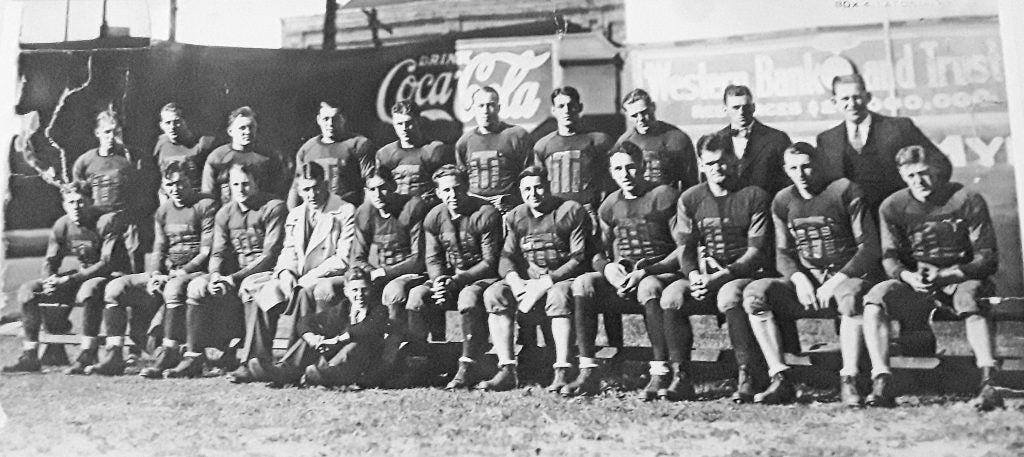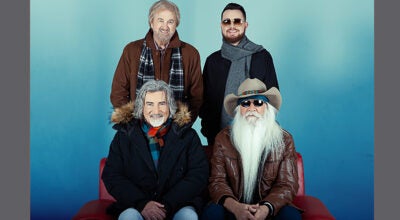Ironton Tanks celebrating 100th anniversary
Published 4:04 pm Friday, September 13, 2019
This year marks the 100th anniversary of the National Football League. And while the NFL celebrates its inaugural season, the league should pay tribute to the small-town communities who were the inspiration for pro football.
One such community was Ironton which, coincidently, is celebrating the 100th anniversary of the legendary Ironton Tanks.
In the 19th and early 20th centuries, this small town was booming as the leading pig iron center of the world. Among its many productions was the famous “Swamp Angel” cannon used in the Civil War.
The automobile industry relied heavily on Ironton for the casting of parts. Railroads ran through the town to distribute the parts, especially the Detroit, Toledo and Ironton railroad owned during the 1920s by Henry Ford.
But the pig iron industry virtually evaporated in the area, much like the rest of the country. The six iron ore furnaces still remain visible throughout the Ironton area as historical remembrances of the era.
But it was also a time in this area that professional football began to take a toehold. Unlike today’s NFL, with teams situated in major metropolitan cities, pro football was a small-town sport.
An NFL team 100 years ago was nothing more than a glorified Ironton Tanks team, generating more money but not necessarily bigger salaries. The cost of a franchise was $100.
It was a time when football was capturing the attention of the nation. The love affair America has today with football was in its infancy and that love began and was nurtured at the local level.
There were several neighborhood teams in Ironton. The Irish Town Rags — forerunners to the Tanks — were on one end of town while the Lombard Submarines were at the south end.
Portsmouth, Ashland, Kentucky and Huntington, West Virginia also had their own teams and a league was eventually formed among the cities. It was games between the Tanks and the Portsmouth N&W Smoke House and later the Spartans that ignited the high school rivalry that is in place today between Ironton and Portsmouth high schools.
There were other teams on the Tanks schedule from New Boston, Jackson, Wellston, Athens, Logan, Lancaster, Washington Court House, Columbus, Cincinnati, Dayton, Akron, Chillicothe and Nitro, West Virginia.
The Tanks expanded their schedule to play Marshall College, Morris Harvey College (now the University of Charleston), Rio Grande College, Kansas City, Louisville, Memphis, Toledo and Washington, Pa.
And, of course, the two games that caught the eye of the nation when the Tanks played the second and third place teams of the NFL in 1930, beating the New York Giants and Chicago Bears at Redland Field which was the home of the Cincinnati Reds professional baseball team.
The Tanks began to bring in players during the 1920s and pay salaries of $100, $200 and $300 a game depending on the player. They also gave teaching and coaching jobs to players to give them steady work which allowed them to make more money than if they were playing in the NFL.
A player earning $100 per game in 1930 was the equivalent of $1,536, $200 was like getting $3,072 in today’s marker and $300 was the same as $4,609 by today’s standards.
The Tanks featured some great players throughout their 12-year existence including quarterback and defensive back Glenn Presnell, the team’s most successful player who later earned fame as an All-Pro and led the Detroit Lions to their first-ever league championship.
Presnell was a first team All-American at Nebraska who led the nation in rushing during his 1927 senior year. Nick McMahon sent Presnell a letter offering him a teaching job at a local high school at $2,000 a year and $150 per game with the Tanks.
Presnell accepted the offer because it was more than he could make playing in the newly-formed NFL.
“I was contemplating playing pro ball, then I received a letter from Nick McMahon,” Presnell said in an interview with The Ironton Tribune. “It was signed ‘Manager of the Ironton Tanks.’ I had never heard of Ironton, Ohio. I didn’t know where it was. I had to get out my map. I was interested because of what he told me.
“That was pretty good money at the time, so I took it.”
The Tanks first game was a 9-0 win over the New Boston Tigers. A 7-0 loss and 0-0 tie with the Ashland (Ky.) Playhouse followed and then a 12-0 win over Portsmouth N&W capped the brief four-game schedule in 1919.
The coach, manager and captain of the team was I.H. “Doc” Stewart.
There were other things that were different during the early era of pro football.
Fan support for the Tanks and other pro teams was very strong, drawing anywhere from 300 to 1,500 before the grandstands were erected. However, a lot of games featured fights among the fans due to the heavy amount of money bet on the games. A game with rival Portsmouth was once rumored to have $10,000 wagered on the outcome. Ironton won the game when Portsmouth had a touchdown called back on a penalty and it created several fights afterwards.
Could the officials have helped change the outcome? Considered that once an official from Columbus named Jim Durphy used to stand behind the Tanks’ huddle and offer bits of helpful information.
It was Rolph who recalled that Durphy “would say things like, ‘You can trap their tackle.’ His wife made candy on the side, so after the game he would try and sell us all candy.”
The rivalry with the Tanks and Spartans carried over to the high schools. Ironton and Portsmouth have played more football games than any other schools in Ohio high school history.
In fact, the Tanks had only one losing season when they went 5-6 in 1929 due in part to Presnell being injured the entire season. But the Tanks handed Portsmouth its only loss of the year, 3-0. Portsmouth won two other games played against the Tanks that season 20-0 and 39-0.
Rolph recalled that Portsmouth “wanted to win so badly that they went out and recruited a whole new team for the next time we played them.”
It has been reported that Portsmouth was able to get the legendary Jim Thorpe to play for them against the Tanks both at Portsmouth and on the Tanks Memorial Stadium field.
Rolph grew up in Ironton and often attended games when he was in high school. He saw how they rolled over opponents and said that the “steamroller style” helped give birth to the team’s nickname.
Rolph said that during World War I Sherman tanks destroyed everything in their paths without showing any mercy. After a rout of rival Portsmouth, the headline in the Ironton newspaper read “Ironton Runs Over Portsmouth Like Tanks.”
The nickname stuck.
Rolph also talked about the training methods of teams, or lack thereof. There was no such thing as weightlifting or strength and conditioning coaches. He said, “You were your own boss when it came to taking care of yourself. Taping was usually out of the question. You only taped the area that was needed. It was the survival of the fittest.”
Besides McMahon, other owners included Scubby McMahon, Bill Brooks, who was a salesman for the Alpha Portland Cement plant, Jimmy Lambert of the C&O Railroad, and Evard Lee who was a star athlete in the Big Ten.
Brooks also served as a head coach for the Ironton High School team in 1919.
Unlike owners today, the Tanks owners preferred to remain in the background. Rolph said “Scubby was a very private individual. He was an excellent citizen but very shy. You’d never know he had such a concern for the team and town. You never saw him on the sidelines.”
The iron ore industry brought people and jobs to Ironton, but it was the Tanks who made a name for the town. In 12 seasons, the Tanks had a record of 85 wins, 19 losses and 14 ties.
“(The Tanks) put Ironton on the map,” said Rolph. “It meant everything to Ironton. The whole town revolved around the Ironton Tanks.”





